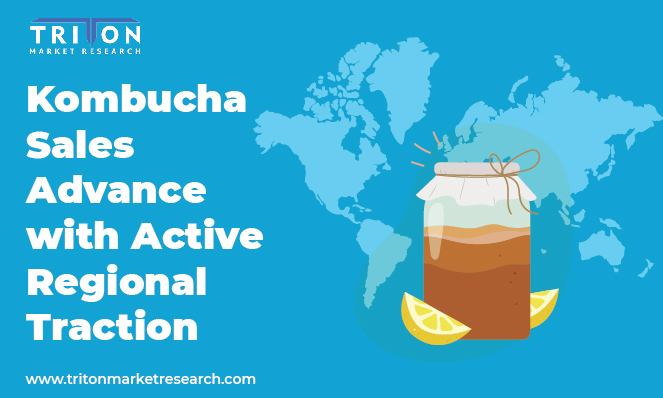



18, February 2022

From homemade beverage to a commercial product, kombucha drink has gained considerable traction over the past few years. Prepared by fermenting sweetened tea with a culture of yeast and bacteria, its market penetration has grown substantially across regions owing to a rise in disposable income, governmental support, demand for health drinks, and exemption from alcohol taxation.
During fermentation, up to 1% of alcohol can occur naturally, which results in federal excise taxes reserved mainly for alcoholic beverages. As a result, several lawmakers have introduced bicameral legislation that would eliminate federal alcohol taxes on kombucha tea across the US, leading to high volume sales of the beverage.
What’s more, given their alcohol content, it’s interesting to note that beer and kombucha use similar brewing processes involving yeast; however, kombucha serves around 30 calories per serve, less than any light beer. This further drives kombucha production and sales as consumers follow the trend of healthy hydration.
Based on Triton’s research, the global kombucha market is estimated to progress at a CAGR of 22.21% over the forecasting years 2019-2028.
Packaging innovations, such as the introduction of slim cans, lower the price point. This reduced price attracts a larger audience, resulting in higher sales.
Food fortification refers to adding extra nutrients such as Vitamin A, B, D, iron, and iodine, among others. As fortified food and beverages prevent the risk of nutrient deficiencies, fortified kombucha tea demand has surged significantly in the global market.
Introduction of kombucha tonics, drink mixes, and RTD beverages, makes it easier for consumers to adapt to kombucha as a functional ingredient. The accessibility and convenience offered by these products widen the kombucha market share.
As mentioned earlier, the alcohol tax exemption of kombucha drinks increases its share as the fastest-growing product in the beverage category. Since many brewers are small businesses, eliminating taxes helps them expand their geographical footings, leading to kombucha market growth.
The present market setting indicates that regions have established opportunistic footholds, with regards to accelerating demand for kombucha-infused beverages.
North America has a stronghold over the kombucha market, mainly given the growing health awareness that leads to elevated demand for functional beverages. In the United States, kombucha is among the fastest-growing fermented beverages across all retail shelves. With this increased demand, manufacturers are introducing new flavors to sustain their market share and amplify volume sales. For example, Brew Dr. Kombucha introduced its Tranquil series infused with 25mg CBD, gaining consumers’ attention looking to benefit from CBD.
In Canada, manufacturers are focusing mainly on different distribution strategies to stabilize footprints, resulting in higher kombucha sales. For instance, Tonica Kombucha distributes its products across the country, targeting more than 450 outlets. As per our estimates, flavored kombucha drinks dominate the market, accounting for almost 90.8% of the market.
The rising inclination towards a healthy diet has surged the kombucha consumption rate in the United Kingdom, expanding the market size considerably over the last few years. This growth mainly results from increased e-commerce sales, yielding high profits for major players. In addition to e-commerce promotion, the introduction of new flavors and packaging trends have spiked consumer interest in kombucha drinks. For instance, GO kombucha premiumized its offerings by introducing distinct product design, driving its sales across the finest hotels and exclusive clubs.
Germany’s kombucha market is among the largest, following the UK. Earlier, kombucha was used to treat cancer. This has led to a surge in research activities to evaluate the kombucha benefits in treating multiple conditions, such as diabetes, cancer, and others.
Australia has emerged as the most attractive market for kombucha in the region. Numerous international players are expanding their business through acquisitions and product launches. For instance, the Coca-Cola Company entered the kombucha market by acquiring Organic & Raw Trading Co, resulting in the launch of Australia’s MOJO brand of fermented kombucha.
Besides, as per industry estimates, the Australian market has witnessed an exceptional boom in the kombucha market as consumers abandon beverages with high sugar content. This translates to high year-on-year growth over the forecast period.
While kombucha offers various health benefits, it is equally crucial to understand other trends influencing kombucha sales.
Several kombucha brewers offer a large assortment of flavors, along with their classic offerings. This has amplified investments to formulate new tropical flavors catering to local preferences. For instance, Buchi Kombucha has added combinations of varied ingredients like beet juice, cayenne, herbs, ginger, spices, and edible flowers to manufacture new kombucha drinks.
Also, with the rising trend of consuming organic ingredients, there is an upscale in kombucha application in other F&B segments like breakfast meals, candies, and ice-cream toppings. This will ultimately generate new opportunities for the players to widen their foothold in the global kombucha market.
Considering their alcohol content, it’s interesting to note that beer and kombucha use similar brewing processes involving yeast; however, kombucha serves around 30 calories per serve, less than any light beer. This further drives the kombucha demand among consumers following the trend of healthy hydration.
From homemade beverage to commercial product, kombucha has gained considerable traction over the past few years. Prepared by fermenting sweetened tea with a culture of yeast and bacteria, its market penetration has grown substantially across regions owing to a rise in disposable income, governmental support, demand for health drinks, and exemption from alcohol taxation.
The global kombucha market is estimated to progress in revenue at a CAGR of 22.21% over the forecasting years 2019-2028.
North America has a stronghold over the kombucha market, mainly given the growing health awareness that leads to high demand for functional beverages. In the United States, kombucha is among the fastest-growing fermented beverages across all retail shelves.

Prevalent cases of terrorist attacks in today’s world is increasing the need for severe standards of security for public safety, and the global market for biometric technology scrupulously accommoda..
Prevalent cases of terrorist attacks in today’s world is increasing the need for..